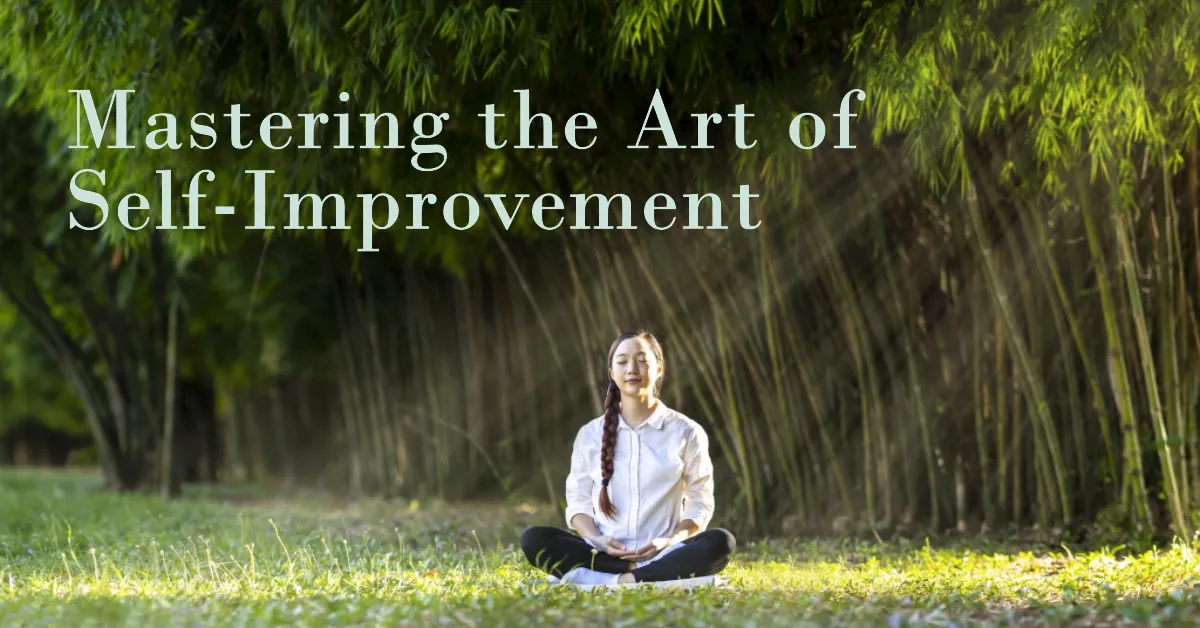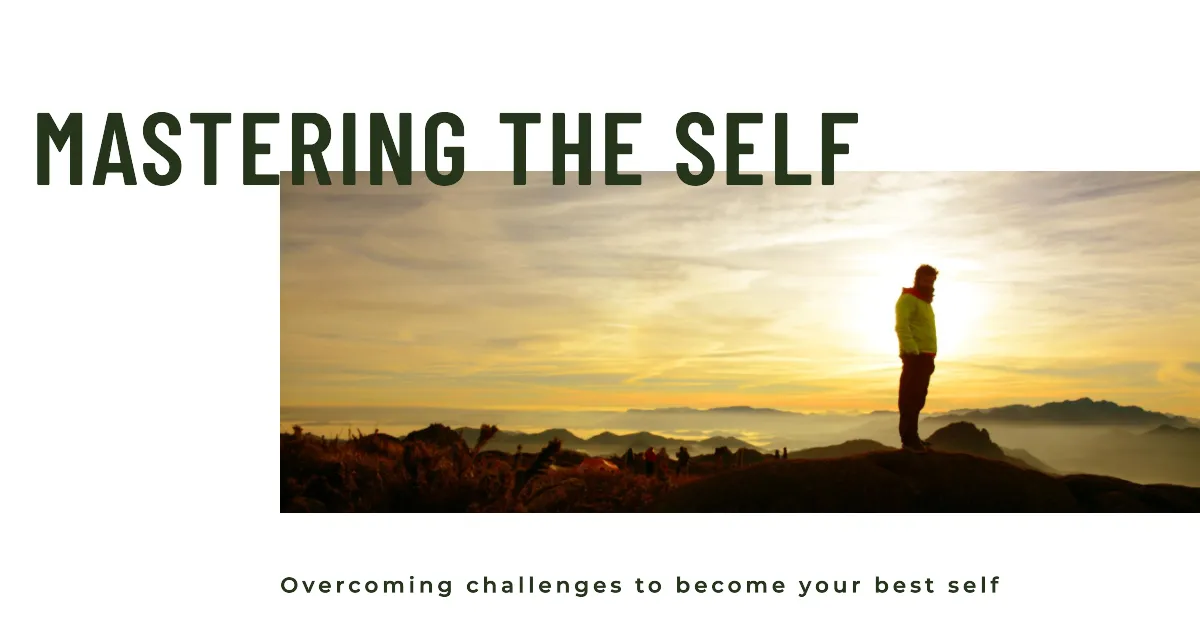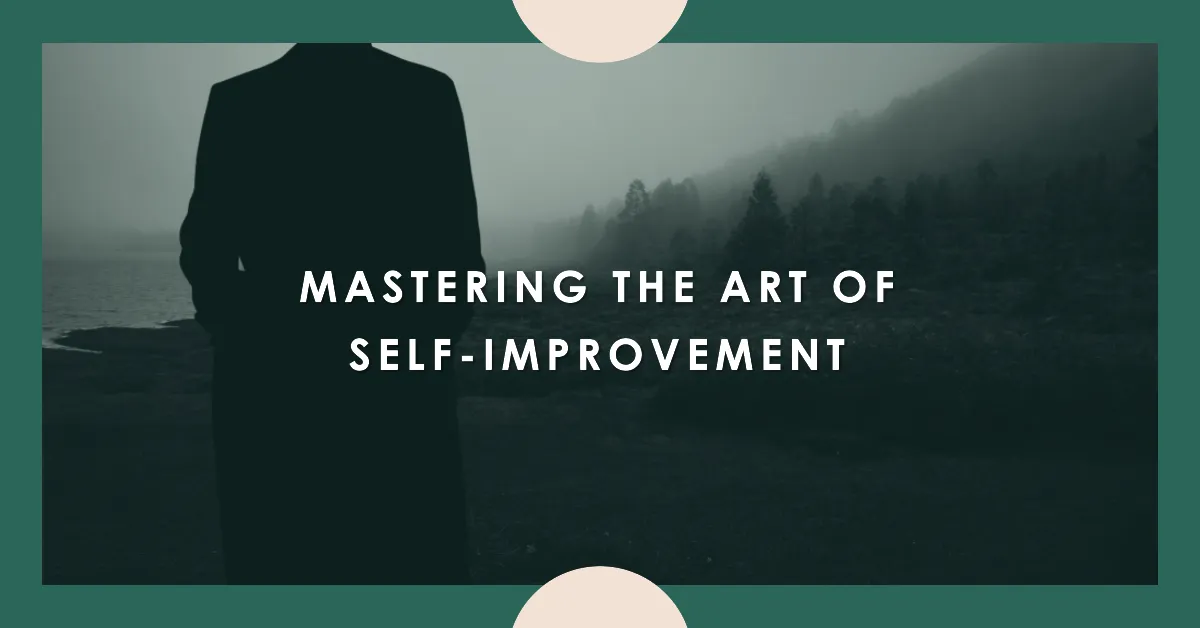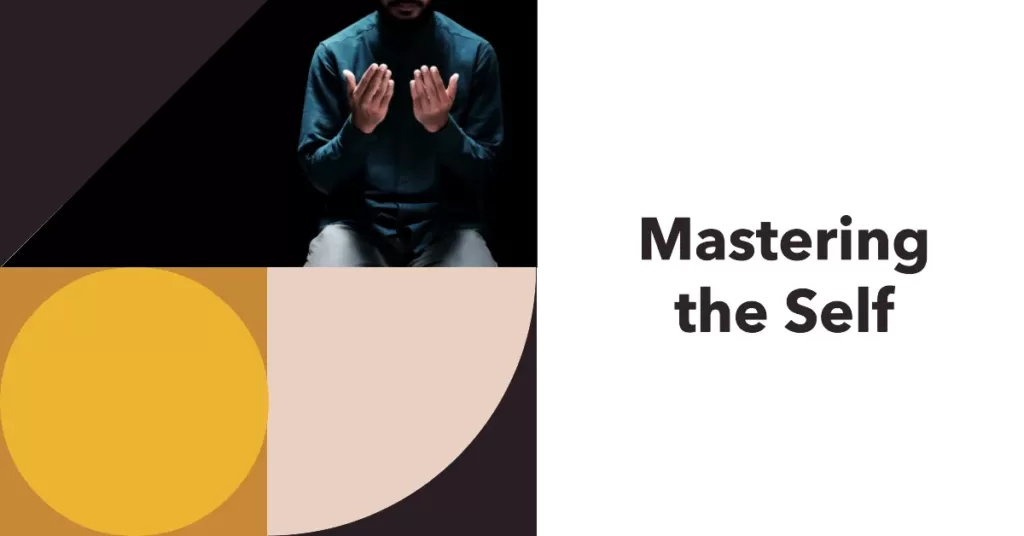Do you ever feel like your thoughts and emotions are controlling you, rather than the other way around? Do you find yourself reacting to situations rather than responding thoughtfully? If so, it may be time to consider mastering the self. Mastery of the self is about taking control of your thoughts and emotions, allowing you to live a more intentional and fulfilling life.
Many people equate mastery with perfection, but that’s not what this concept is all about. Instead, it’s about developing awareness of your thoughts and feelings so that you can respond in ways that align with your values and goals. It’s about cultivating self-discipline and resilience so that setbacks don’t derail your progress. And ultimately, it’s about creating a sense of inner peace and freedom that comes from knowing that no matter what happens externally, you have the power to choose how you respond internally.
Table of Contents
Key Takeaways
- Mastery of the self involves taking control of thoughts and emotions for a more intentional and fulfilling life;
- It requires developing self-awareness, self-reflection, and self-discipline to overcome setbacks and align with values and goals;
- Techniques like meditation, visualization, journaling, and practicing gratitude can help achieve mastery of the self;
- A mastery-based mindset embraces challenges, views mistakes as learning opportunities, takes calculated risks, and prioritizes continual growth and development.
Understanding the Concept of Self-Mastery
You may be wondering, what exactly is mastery of the self? Well, it’s the ability to take control of your thoughts and emotions in order to achieve personal growth and happiness. For example, imagine you struggle with anger management and often lash out at those around you. Through mastering yourself, you learn techniques to manage your anger and respond in a more positive way, leading to healthier relationships with others.
Mastery of the self involves understanding who you are as an individual. It requires introspection and reflection on your values, beliefs, strengths, weaknesses, and goals. When you have a clear understanding of yourself, you can then work toward cultivating traits that align with your values and goals. This includes developing self-discipline, self-awareness, empathy for others, and resilience in the face of challenges.
The journey toward mastering yourself is not an easy one but it is worth embarking on because it allows you to live life on your own terms. It gives you freedom from negative thought patterns or limiting beliefs that hold you back from achieving your full potential. By taking control over how we think and feel about ourselves we become empowered individuals who can create our own destiny rather than being victims of circumstance.
In essence, mastery of the self serves as a foundation for all other aspects of personal development such as career growth or building meaningful relationships with others. We must constantly strive for self-improvement by practicing mindfulness,self-reflection, and honing our skills. It takes time, determination, and effort but once achieved, it leads us down a path of true fulfillment, happiness, and success.
Benefits of Self-Mastery

When you master yourself, your life will improve in many ways. You’ll make better decisions because you’ll be more aware of your thoughts and emotions. Your emotional intelligence will increase, allowing you to handle difficult situations with grace and ease. And as a result, your relationships with others will become stronger and more fulfilling. So take the time to focus on mastering yourself – it’s worth it!
Improved Decision Making
Enhancing self-mastery can lead to better decision-making skills, ultimately improving the course of one’s life. When you have a good grasp of your emotions and thoughts, you are less likely to make impulsive decisions that may negatively impact your future. Instead, you will be able to take a step back, assess the situation objectively, and consider all possible outcomes before making a well-informed decision.
Moreover, when you have mastered yourself, you become more confident in your choices. You trust your intuition and judgment because you know that they are based on sound reasoning and not just impulse or emotion. This confidence translates into other areas of your life as well, such as in relationships or career decisions. By honing your decision-making skills through self-mastery, you create a positive ripple effect throughout all aspects of your life.
Increased Emotional Intelligence
Get ready to understand and connect with your emotions on a deeper level, as increasing your emotional intelligence will lead you to recognize, manage, and express them in healthy ways. Emotional intelligence involves being aware of your own feelings and those of others around you. By doing so, you can better understand why people behave the way they do and make effective decisions based on empathy.
When you increase your emotional intelligence, it becomes easier to communicate effectively with others. You’ll be able to handle difficult conversations with ease while remaining calm and composed. This skill helps build trust in relationships which is essential for personal growth. Having strong emotional intelligence also allows you to regulate your own emotions effectively by recognizing how they affect your behavior. By doing so, you can take steps toward managing them in healthy ways that won’t negatively impact yourself or the people around you. So start developing this skill today and see how it benefits every aspect of your life!
Better Relationships
Improving our ability to connect with others can lead to more fulfilling and positive relationships in our lives. Whether it’s with family, friends, or co-workers, having better relationships can greatly enhance our overall sense of wellbeing. Here are five ways that mastering the self can help you build better connections with the people around you:
- Being present: When we’re fully engaged in a conversation and actively listening to the other person, they feel seen and heard. This creates a deeper connection between us.
- Empathy: Understanding someone else’s perspective helps us relate to them on a more personal level. It also allows us to respond appropriately and show that we care about their feelings.
- Authenticity: Being true to ourselves and expressing our thoughts and emotions honestly creates trust and respect within our relationships.
- Forgiveness: Letting go of past hurts frees up emotional space for positive interactions. Holding onto grudges only serves to create distance between us.
- Gratitude: Expressing appreciation for the people in our lives shows them that they matter to us. It also reinforces positive behaviors, leading to even stronger connections.
By mastering these aspects of ourselves, we become better equipped to build strong relationships with those around us. Remember, building meaningful connections is not only good for your mental health but also essential for creating a life filled with joy and purpose.
Steps to Achieving Self-Mastery

If you want to achieve mastery of the self, there are three key steps that you need to focus on: self-awareness, self-reflection, and self-discipline. By becoming more conscious of your thoughts, emotions, and behaviors through self-awareness, you can begin to identify areas for improvement. Self-reflection allows you to evaluate your progress and make necessary adjustments along the way. Finally, self-discipline is essential for staying committed to your goals and making consistent progress toward achieving them. With these three steps in mind, you can start taking control of your life and mastering the art of being yourself.
Self-Awareness
You’ll be amazed at how much easier it is to navigate life when you’re aware of your own thoughts and emotions. Self-awareness is the key to mastering the self, as it allows you to understand your reactions and behaviors in different situations. When you’re not aware of yourself, you may find that you’re reacting in ways that don’t serve your highest good, which can lead to a feeling of being stuck or unhappy.
To become more self-aware, it’s important to regularly check in with yourself and reflect on your thoughts and emotions. You can start by taking a few minutes each day to breathe deeply and observe what comes up for you. Additionally, keeping a journal can help you track patterns in your behavior and identify areas where you may need additional support or growth. Remember that self-awareness is an ongoing process, so be patient with yourself as you continue to learn about who you are and how best to show up in the world.
| COLUMN 1 | COLUMN 2 |
|---|---|
| Recognize triggers | Identify coping mechanisms |
| Notice patterns in behavior | Practice mindfulness techniques |
| Reflect on past experiences | Cultivate self-compassion |
| Seek feedback from others | Stay open-minded toward change |
Use this table as a guide for developing your self-awareness practice. By recognizing triggers, noticing patterns in behavior, reflecting on past experiences, seeking feedback from others, practicing mindfulness techniques, cultivating self-compassion, staying open-minded toward change, and identifying coping mechanisms; You’ll be able to develop better emotional intelligence skills which will ultimately lead toward mastery of the self!
Self-Reflection
Take a moment to reflect on your recent experiences and emotions. This simple act of self-reflection can help you gain valuable insights into yourself that may have been previously hidden.
As you look back, consider the following:
- What brought you joy?
- What caused stress or anxiety?
- What did you learn from these experiences?
Self-reflection is an important tool in mastering the self because it allows us to identify our strengths and weaknesses, enabling us to make better decisions moving forward. By taking time to reflect on past experiences, we become more aware of patterns in our behavior and thought processes which in turn helps us understand ourselves better. Self-reflection isn’t always easy, but it’s worth making the effort if you truly desire freedom from old habits and negative thought patterns that may be holding you back. So take a few moments each day to reflect on your experiences and emotions, as this will ultimately lead you toward greater personal mastery.
Self-Discipline
Developing strong self-discipline is crucial for achieving success in any area of life, as it requires consistent effort and dedication toward one’s goals. Self-discipline allows you to control your actions and thoughts, helping you stay focused on what truly matters. It gives you the ability to resist temptation and make choices that align with your long-term objectives.
To better understand how self-discipline works, let’s take a look at this table:
| Action | Impulsive Response | Disciplined Response |
|---|---|---|
| Eating | Binge-eating junk food | Choosing healthy options |
| Sleeping | Staying up late watching Netflix | Going to bed early |
| Working | Procrastinating and avoiding tasks | Prioritizing important tasks |
As you can see, developing self-discipline involves making conscious decisions that benefit you in the long run rather than giving in to short-term impulses that may lead to negative consequences. With practice, self-discipline becomes easier over time, leading to increased productivity, improved relationships, and ultimately greater success in achieving your goals. So go ahead and start working on strengthening your self-discipline today – the rewards are sure to be worth it!
Techniques for Self-Mastery
By using techniques such as meditation and visualization, you can achieve mastery of the self. These practices help you to cultivate a deeper understanding of your thoughts and emotions, allowing you to gain more control over them. Meditation is a powerful tool for calming the mind and increasing focus. By sitting in silence and observing your thoughts without judgment, you can develop greater awareness of your inner world.
Visualization is another technique that can be used to master the self. It involves creating mental images of what you want to achieve or become. This practice helps you to program your subconscious mind with positive beliefs and attitudes, which can then influence your behavior in the real world. When you visualize yourself as confident, successful, and happy, these qualities will begin to manifest in your life.
The next effective technique for mastering the self is journaling. Writing down your thoughts and feelings on paper allows you to examine them more objectively. By reviewing past entries, you can identify patterns in your thinking or behavior that may be holding you back from achieving your goals. Journaling also provides an outlet for processing difficult emotions like anger or sadness.
Practicing gratitude is also a powerful way to shift your mindset toward positivity and abundance. By focusing on the things in life that bring joy and fulfillment, rather than dwelling on what’s lacking or negative, you create space for more good things to enter into your life. Gratitude also helps cultivate a sense of humility and appreciation for all that life has given us.
By incorporating practices like meditation, visualization, journaling, and gratitude into our daily lives we can begin to mold our inner world like a potter molds clay – achieving mastery of the self. These techniques allow us to gain greater awareness of our thoughts and emotions while developing positive beliefs about ourselves which ultimately lead us toward freedom from limiting beliefs so we may achieve our true potential!
Challenges to Overcome in the Pursuit of Self-Mastery

When pursuing mastery of the self, you will face several challenges that can hinder your progress. The first challenge is resistance to change, which can make it difficult for you to adopt new habits and behaviors. Secondly, negative self-talk can undermine your confidence and prevent you from believing in yourself. Finally, fear of failure can hold you back from taking risks and trying new things. Overcoming these obstacles requires resilience, determination, and a commitment to personal growth.
Resistance to Change
Despite our natural resistance to change, mastering the self requires us to embrace new experiences and challenges. It’s understandable why we might resist change; it’s uncomfortable, unpredictable, and can even be downright scary. However, if you want to truly master yourself, you need to learn how to handle change with grace and agility.
One way to do this is by reframing your mindset around change. Instead of viewing it as a negative experience, try seeing it as an opportunity for growth and learning. Remember that every challenge you face is an opportunity for you to strengthen your resilience and develop new skills. With practice, embracing change will become easier and more natural for you, allowing you to continue on your journey toward true mastery of the self.
Negative Self-Talk
You’ve got to stop with the negative self-talk, it’s only holding you back and making you feel worse about yourself. Your mind is a powerful tool, but when you use it to constantly put yourself down, it becomes your worst enemy. Instead, try to focus on positive affirmations that can help rewire your brain and build up your self-esteem.
To overcome negative self-talk, here are four strategies that can help:
- Identify your negative thoughts: Take notice of when you start thinking negatively about yourself. Once you recognize these patterns, you’ll be better equipped to challenge them.
- Challenge those thoughts: Ask yourself if they’re true or if there’s evidence to support them. More often than not, our negative thoughts are based on assumptions rather than facts.
- Reframe those thoughts: Instead of saying “I’m not good enough”, try reframing it as “I’m still learning and growing”. This shift in perspective can make all the difference.
- Practice daily affirmations: Repeat positive statements like “I am worthy” or “I am capable” every day until they become ingrained in your mind.
Remember, mastering the self starts with how we talk to ourselves internally. By eliminating negative self-talk and practicing positivity every day, we can break free from limiting beliefs and achieve our goals with confidence.
Fear of Failure
You’ve heard it before: “You are your own worst critic”. This rings especially true when it comes to negative self-talk, as discussed in the previous subtopic. But what is at the root of that negativity? Oftentimes, it’s fear – specifically, fear of failure.
The fear of failure can be paralyzing. It keeps you from trying new things and taking risks because you’re scared of falling short. But here’s the thing: failure is not a reflection of your worth as a person. In fact, some of the most successful people in history have experienced countless failures before achieving their goals. Mastery of the self means recognizing this truth and pushing through your fears to pursue your dreams anyway. Take a look at this table for more insight:
| Fear-based mindset | Mastery-based mindset |
|---|---|
| Avoids challenges | Embraces challenges |
| Views mistakes as failures | Views mistakes as learning opportunities |
| Is afraid to take risks | Takes calculated risks |
| Believes talent is fixed | Believes in growth and development |
By adopting a mastery-based mindset, you can overcome your fear of failure and unlock your full potential. It all starts with changing how you approach challenges and mistakes – instead of shying away from them, embrace them as opportunities for growth. And remember: success is not about being perfect or never failing; it’s about persevering despite those setbacks and coming out stronger on the other side.
Continual Growth and Development

As you continue on your journey toward mastery of the self, like a tree constantly growing new branches and leaves, you must prioritize continual growth and development. This means that you should always be looking for ways to improve yourself, whether it’s through learning new skills or taking on challenging projects. By doing so, you will not only become more knowledgeable and capable but also more confident in yourself and your abilities.
One way to ensure that you are continually growing is by setting goals for yourself. These goals should be specific, measurable, achievable, relevant, and time-bound (SMART). By setting SMART goals, you will have a clear roadmap for achieving success in whatever area of your life you choose to focus on. Additionally, when you achieve these goals, you will feel a sense of accomplishment that will motivate you to keep pushing forward.
Another important aspect of continual growth and development is seeking out feedback from others. Whether it’s from a mentor or coach or even just friends and family members who know us well enough to offer honest advice – getting feedback can help us see our blind spots and identify areas where we need improvement. It can also help us stay accountable to ourselves as we work toward our goals.
Remember that growth is not always easy or comfortable – in fact, it often involves stepping outside of our comfort zones. But if we want to reach our full potential as human beings and live lives that are fulfilling and meaningful, we must be willing to take risks and try new things. So embrace the challenges that come with continual growth and development – they are opportunities for transformation!




